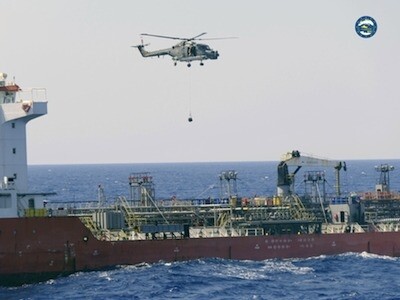German and Italian frigates enforcing the UN arms embargo on Libya impounded a merchant vessel transporting jet fuel from the UAE to Benghazi |
Libya
As part of the EU mission enforcing the UN arms embargo on Libya (Operation Irini), the German frigate FGS Hamburg, supported by the Italian frigate ITS Margottini, boarded and impounded the merchant vessel Royal Diamond 7, which was transporting jet fuel from the UAE port of Sharjah to Benghazi. Operation Irini commander Admiral Ettore Socci announced they were diverting the merchant vessel to an EU port for further investigation. Abu Dhabi is one of the main patrons of Khalifa Haftar’s Libyan National Army based in the country’s east.
Turkey
French President Emmanuel Macron hosted in Corsica Thursday the leaders of the other six EU members with Mediterranean coastlines to reach consensus on Turkey’s illegal drilling and oil/gas exploration in Cypriot and Greek waters. A joint communiqué issued after the summit warned “that in absence of progress in engaging Turkey into a dialogue and unless it ends its unilateral activities, the EU is ready to develop a list of further restrictive measures.” Fahrettin Altun, head of media and communications in the Turkish presidency, responded by calling Macron a “wannabe Napoleon” who “armed terrorists in Libya and hurt NATO’s southern flank.” The present crisis in the eastern Mediterranean began on August 10 when Ankara dispatched the seismic survey vessel Oruc Reis, accompanied by Turkish warships, to the Greek continental shelf to search for oil and gas deposits. Greece in turn sent its own warships to monitor the Turkish flotilla’s activity and conducted joint training exercises off Crete with the French navy. Then, on August 16, the state-owned Turkish Petroleum Corporation (TPAO) communicated the Yavuz drillship and three support vessels would continue operating in waters claimed by Cyprus between August 18 and September 15. EU Foreign Minister Josep Borrell stated after an August 27-28 meeting of the bloc’s foreign ministers that the EU could impose sanctions on Turkish individuals, assets, and ships while restricting Turkey’s access to European ports, capacities, technologies, and supplies if Ankara continues violating Cypriot and Greek sovereignty.
On September 4, NATO Secretary-General Jens Stoltenberg said that Greece and Turkey “agreed to enter into technical talks at NATO to establish mechanisms for military de-confliction to reduce the risk of incidents and accidents in the eastern Mediterranean.” While Greek and Turkish officials met for the talks on Thursday at NATO headquarters in Brussels, the countries offered radically different depictions of what transpired. According to a Turkish Defense Ministry statement, the officials discussed “measures to prevent any potential interferences by military elements” and “an exchange of ideas was carried out.” Diplomatic sources in Athens, on the other hand, insisted no discussion took place with any Turkish officials and that Greece merely submitted answers to Stoltenberg’s proposals for the de-confliction mechanism.
Iran
Refinitiv Eikon reported the Iranian-flagged tanker Forest, which is transporting about 300,000 barrels of fuel to Venezuela, is sailing around the Cape of Good Hope rather than through the Suez Canal. The similarly sized Iranian tankers Faxon and Fortune, which departed for Venezuela at the same time as the Forest, switched off their transponders to evade detection and, also like the Forest, did not pass through the Suez Canal at the scheduled date in early September. Their stealth is attributable to US authorities last month seizing on the high seas four tankers – the Luna, Pandi, Bering, and Bella – transporting Iranian fuel to Venezuela. On July 2, US District Judge James E. Boasberg signed a warrant for impounding the ships’ gasoline because its sale intended to benefit sanctioned Iranian entities, particularly the Islamic Revolutionary Guard Corps. The Justice Department declared the US confiscated from the four tankers approximately 1.116 million barrels of petroleum and funds derived from auctioning it “may in whole or in part be directed to the United States Victims of State Sponsored Terrorism Fund.”
Yemen
Yahya Sarea, a spokesman for the Iranian-backed Houthi movement, proclaimed Thursday that the group used a Dul Faqqar ballistic missile and three Samad3 drones to hit an “important target” in Riyadh. Col. Turki Al-Maliki, spokesman for the Saudi-led coalition backing Yemen’s internationally recognized government, told the Saudi Press Agency, “Joint Coalition Forces intercepted and destroyed a number of ballistic missiles and bomb-laden UAVs launched by the terrorist, Iran-backed Houthi militia toward the Kingdom to deliberately and systematically target civilians and civilian objects.” He neither confirmed nor denied the Houthi claim. Saudi Arabia’s cabinet last June condemned the Houthis for attacking civilian parts of the capital with eight armed drones and three ballistic missiles. The Houthis have ramped up attacks on Saudi Arabia in recent days, targeting Abha International Airport with drones on September 8 and August 31. Saudi Arabia also destroyed a remotely controlled Houthi explosive-laden boat in the Red Sea on August 31. After Thursday’s drone attack, John Abizaid, America’s ambassador to Saudi Arabia tweeted: “The United States strongly condemns the most recent Houthi attack, which attempted to target Saudi civilians. We call again on the international community to extend the Iranian arms embargo in order to stop the flow of weapons to the Houthis and to stop these egregious Houthi attacks against the Yemeni people and Yemen’s neighbors.”
Lebanon
A massive fire broke out at Beirut’s port Thursday, a month after 2,750 tons of ammonium nitrate in a warehouse at the port exploded, killing at least 220, wounding more than 6,500, displacing 300,000, and causing perhaps $15 billion in direct damage. The cause of Thursday’s blaze remains unknown.
Micah Levinson is the Washington, DC Resident Fellow at the Middle East Forum







